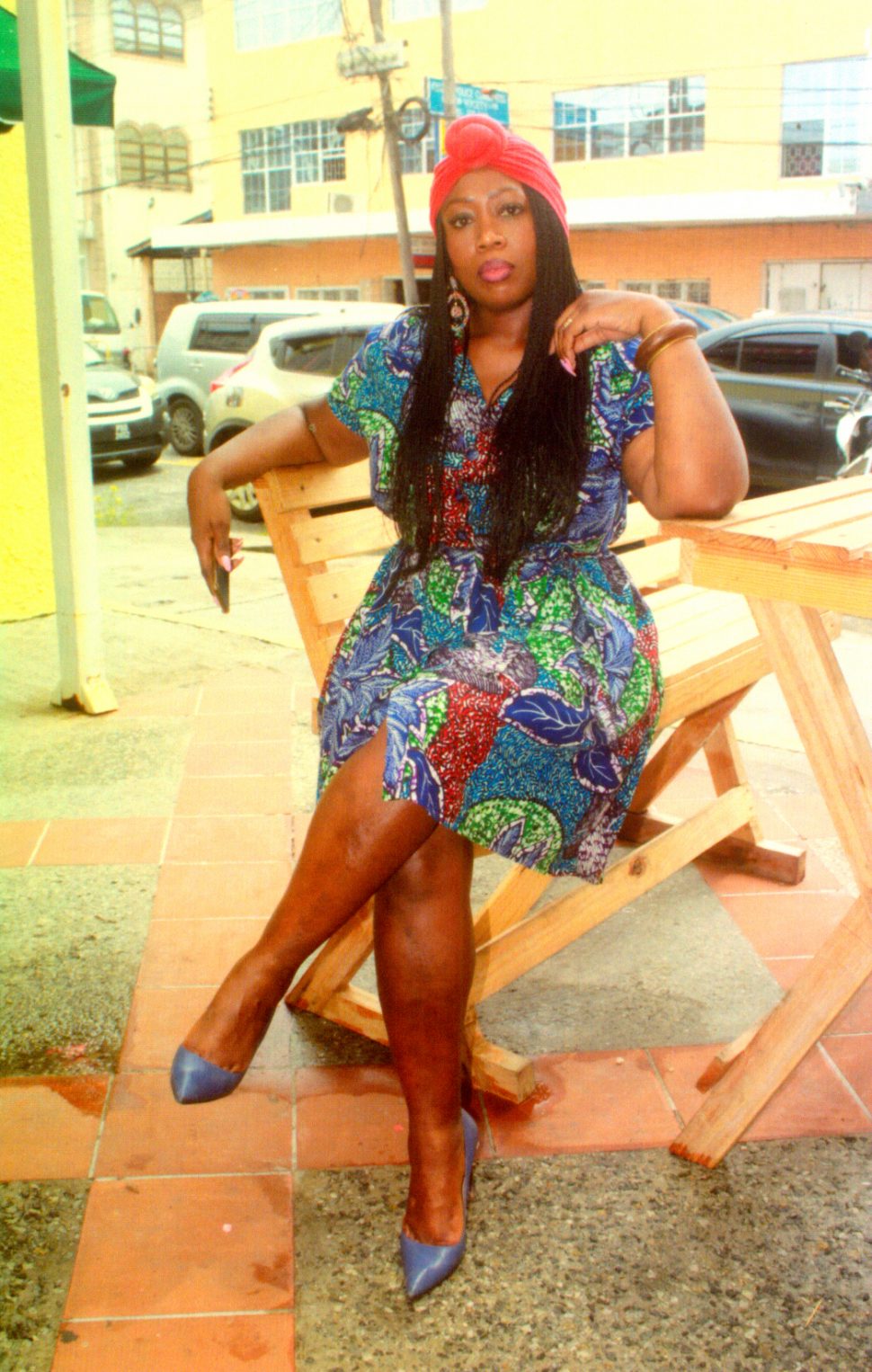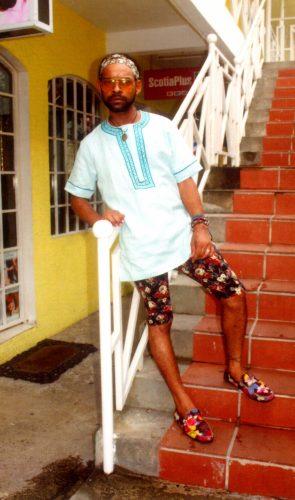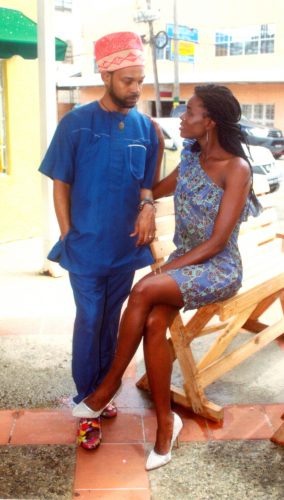It would be altogether worth the while for dress conscious Guyanese of all backgrounds, ages, cultural affiliations and dress preferences notwithstanding, to take themselves along to Anetha’s Elegance in the Courtyard Mall on Robb street (opposite the administrative offices of the Stabroek News). Here, the proprietors have embarked on a unique initiative aimed at causing Guyanese to rethink – not reinvent but rethink – their perspectives on what they wear.
On Friday last, in the course of an absorbing interview with London-based second generation Guyanese, Angelicque Eastman-Owoka, the Stabroek Business learnt that Anetha’s Elegance, almost certainly the local leader in West African clothing and fabric, has thrown its doors open to the general public in a manner designed to create what may well be, among other things, an entirely new perspective on fashion as a tool of cultural cohesiveness. “We’re taking prices down considerably on West African clothing and fabric and we are, as well, challenging people to cross cultural barriers in their mode of dress.”
Angelicque, the daughter of Anetha Daniels, the establishment’s proprietrix, says that she is ready to marry her own contemporary ideas to the work already ‘put in’ by her mother to make a mark in fashion. To do so she has decided to make much of the shop’s entire inventory available at significantly ‘knocked down’ prices. It is, she adds, an initiative designed to bring West African fashion and fabric closer to the consciousness of Guyanese.
It is a marketing ploy that is as creative as it is daring insofar as what she seeks to do, among other things, is to completely transform the manner in which issues of dress are contemplated in Guyana.
The daughter of a mother whom she says has been part of a creative culture for more than forty years, Angelicque is married to a Nigerian businessman, Samuel Owoka. These credentials, she believes, have provided her with insightful perspectives on aspects of both Guyanese and West African culture and it is these assets that she is bringing to bear in helping to take Anetha’s Elegance to another level.
Ironically, her attempt to make what she believes is an important intervention in the Guyanese dress culture is not the sum total of her business interest in Guyana. Although she has always been supportive of her mother’s entrepreneurial pursuits Angelicque has come to embrace Guyana on her own terms. During her interview with the Stabroek Business she revealed that her investment interest in Guyana is probably likely to be connected to the Local Content aspect of Guyana’s emerging oil and gas sector.
In the immediate term however, she has embarked on what may well turn out to be an impactful fashion adventure. Traditionally, African fashion as a dimension to the local dress culture has attached itself largely to special events. The August 1st Emancipation Day celebration customarily brings with it a surfeit of African costumes though Angelicque says that her thinking goes way beyond August 1st. She seeks, she says, to cast her net much further, pushing the national appreciation for West African fabric and fashion into the mainstream Guyanese market. “I want us to change direction. I want us to take on the mainstream fashion market. There is really no reason why a Guyanese woman shouldn’t show up for work in a skirt of a dress made out of beautiful printed, waxed cotton fabric that comes directly from Nigeria or Ghana. There is also no reason why those attractive shorts, trousers and tops that Guyanese women love to wear should not be made from those same fabrics. We’re not taking them out of their favoured fashion zones. We’re simply seeking to afford them a much broader experience as far a fabric is concerned.”
In a sense the emergence of this delightfully articulate and thoughtful young woman heralds the growth of her awakening to her Guyanese heritage having been born and brought up in London and who has, herself, used her own talents to demonstrate her awareness of her own heritage. Since the 1980’s Anetha had loudly ‘proclaimed’ her Guyanese heritage by placing the name of the country of her birth alongside the fashion events which she hosted at the Commonwealth Institute in London, among other places.
After she had returned to Guyana several years later to offer her taste in fashion to the local market, she again demonstrated her determination as a stayer, outlasting the vicissitudes of an economically shaky, unpredictable business environment and some years later a devastating fire at the Charlotte Street premises from where she was displaying and marketing her West African costumes and fabrics,
Angelicque insists that what she is doing is by no means a takeover from her mother but an initiative designed to bring her own perspective to bear in helping to consolidate an enterprise which, for her, reflects her mother’s passion for Guyana. What she wants, she says, is to deploy her own perspective to complement her mother’s passion.
Even in the relatively cramped space that houses Anetha’s Elegance, neither the beauty nor the variety of the male and female costumes and fabrics on offer can conceal themselves. The clothing designs range from attractive to exotic while the pieces of fabric piled high and taking up every inch of space in the cramped enclosure cry out for transformation into both attractive every day wear as well as exotic costumes and headdresses.
As of this week the stock has been sorted and Angelicque is already ‘talking up’ the surprises that are in store. One of her goals, she says, is to help remove the fear of ‘not matching’ from the local dress culture. She believes that hang-ups about colour clashes or the ‘loudness’ of some fabric design in the West African tradition need to be expunged. “Nothing,” she says, “is too ‘busy’ to be worn once it is worn tastefully.”
Accordingly, she talks about the “fashion freedom” in the West African tradition that embraces a preparedness to break with the confines of colour coordination. “Once we get rid of that inhibition, that is the beginning of the popularisation of West African fashion.”
Her daring in the context of the Guyanese culture goes even further. Here, she throws out a challenge to Guyanese women, particularly to dare to cross what are commonly regarded as dress-related ethnic and cultural barriers… “so that women of other races can also begin to explore the possibilities that might repose in including West African prints in their wardrobes.” Fashion, she believes, is universal and in a country like Guyana, “should be used to reflect the sameness rather than the differences. I believe that fashion can and should reach out across races.” Angelicque says.








